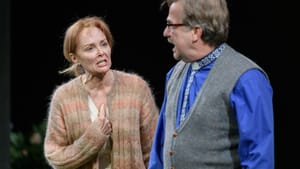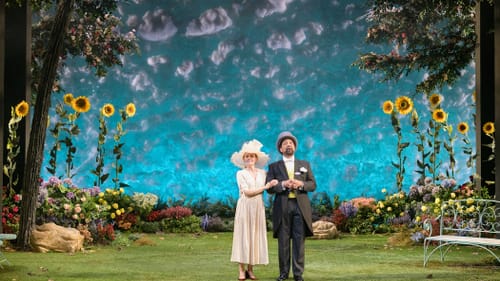Stay in the Loop
BSR publishes on a weekly schedule, with an email newsletter every Wednesday and Thursday morning. There’s no paywall, and subscribing is always free.
What the hell is she thinking?
University of Delaware REP presents Alan Ayckbourn's 'Woman in Mind (December Bee)'

In Alan Ayckbourn’s Woman in Mind (December Bee), the above title isn’t a rhetorical question; it’s the plot. Continuing their 10th-anniversary season, the University of Delaware’s Resident Ensemble Players (REP) mount a memorable production of this British black comedy whose ideas and stagecraft linger long after the curtain falls.
Susan (Elizabeth Heflin) is losing her mind. She’s a normal woman — in other words, a character often ignored in drama. Susan faces a dilemma with which the audience can identify: trying to come to terms with what she wishes her life to be and what it actually is.
Because Ayckbourn is a complex and supple playwright, he surrounds Susan with a panoply of shapeshifting characters. And because Jackson Gay is a supple and incisive director, she delves deeply into this play with a strong point of view that also illuminates the writer’s vision. As in many Ayckbourn works, in the midst of all the intellectual fervor there’s also deeply felt humor and a sometimes-uncomfortable communion with the lead character.
Virtual reality
At first viewing, everyone in Woman in Mind seems real. Then suddenly everyone seems unreal. You’re better served if you give up any search for reality and — as with Samuel Beckett’s work — simply enter Susan’s world to meet the people who populate it.
There’s Bill (Stephen Pelinski), the daft but sympathetic doctor who’s called after Susan falls in her garden. There’s loving, attentive husband Andy (Hassan El-Amin), adoring daughter Lucy (Sam Morales), and man-about-town brother Tony (Michael Gotch).
But wait, here’s another husband, pedantic vicar Gerald (Lee E. Ernst), accompanied by his daft sister Muriel (Kathleen Pirkl Tague) and the couple’s estranged (and oh-so-strange) son Rick (Mic Matarrese).
At first, it seems one family exists and one does not, but it’s soon apparent Ayckbourn drew them all as caricatures. And like a caricaturist exaggerating features, Gay draws her actors into widening behavioral portraits. REP's company is joyously strong, and it’s a treat to see each actor morph and expand their unusual roles.
More than the sum of its parts
Heflin — who only leaves the stage at intermission — is in consummate control of being out of control. She’s able to turn on an emotional dime and takes the audience with her down every road. Beautiful and yet not, confident and yet uncertain, losing her mind and yet gaining it — her Susan is sometimes the sanest person onstage. Ayckbourn plays brilliantly with expectations, and Heflin handles these authorial twists as a first-rate performer.

The show is also a visual and aural tour-de-force. Sound, lights, and scenic design cooperate to clarify or — when required — mystify. Each designer’s work advances the drama, matching and illuminating Ayckbourn with a sensory mashup reminiscent of Hieronymus Bosch, Salvador Dali, and Thomas Kinkade, with an occasional Maxfield Parrish sky. It’s a dazzling show.
Takeshi Kata’s set is thrilling: flowers appear on a swath of green lawn like magic and a bank of incredible clouds lower over the divided house with Shakespearean grandeur. Katherine Roth’s costumes serve and accelerate the ever-intensifying sense of unreality.
Emily Auciello interweaves a soundscape somehow jaunty and menacing with a few jolts of seat-jumping sound. And lighting designer Masha Tsimring seems to employ more colors than the universe holds to set Kata’s cloud bank — itself a character — aglow with elegance and force.
Still crazy after all these years
This immersive theatrical evening may not be everyone’s cup of British absurdist tea. Gay has not updated or Americanized the 1985 script, which holds up 33 years on. Navigating the shifting sands of illusion and reality — and madness and sanity — hasn’t really changed.
The playwright’s vivid verbal and emotional world is so strong that at intermission, audience discussions sounded disconcertingly like dialogue from the play. The intensity lingers long after the curtain falls, and the questions raised don’t easily evaporate.
This is a beautiful production in so many ways. And I really want to see those magnificent clouds light up Ayckbourn’s intellectual sky one more time before they blow away.
What, When, Where
Woman in Mind (December Bee). By Alan Ayckbourn, Jackson Gay directed. Resident Ensemble Players. Through December 2, 2018, at the University of Delaware's Roselle Center for the Arts, 110 Orchard Road, Newark, Delaware. (302) 831-2204 or rep.udel.edu.
Sign up for our newsletter
All of the week's new articles, all in one place. Sign up for the free weekly BSR newsletters, and don't miss a conversation.

 Gail Obenreder
Gail Obenreder